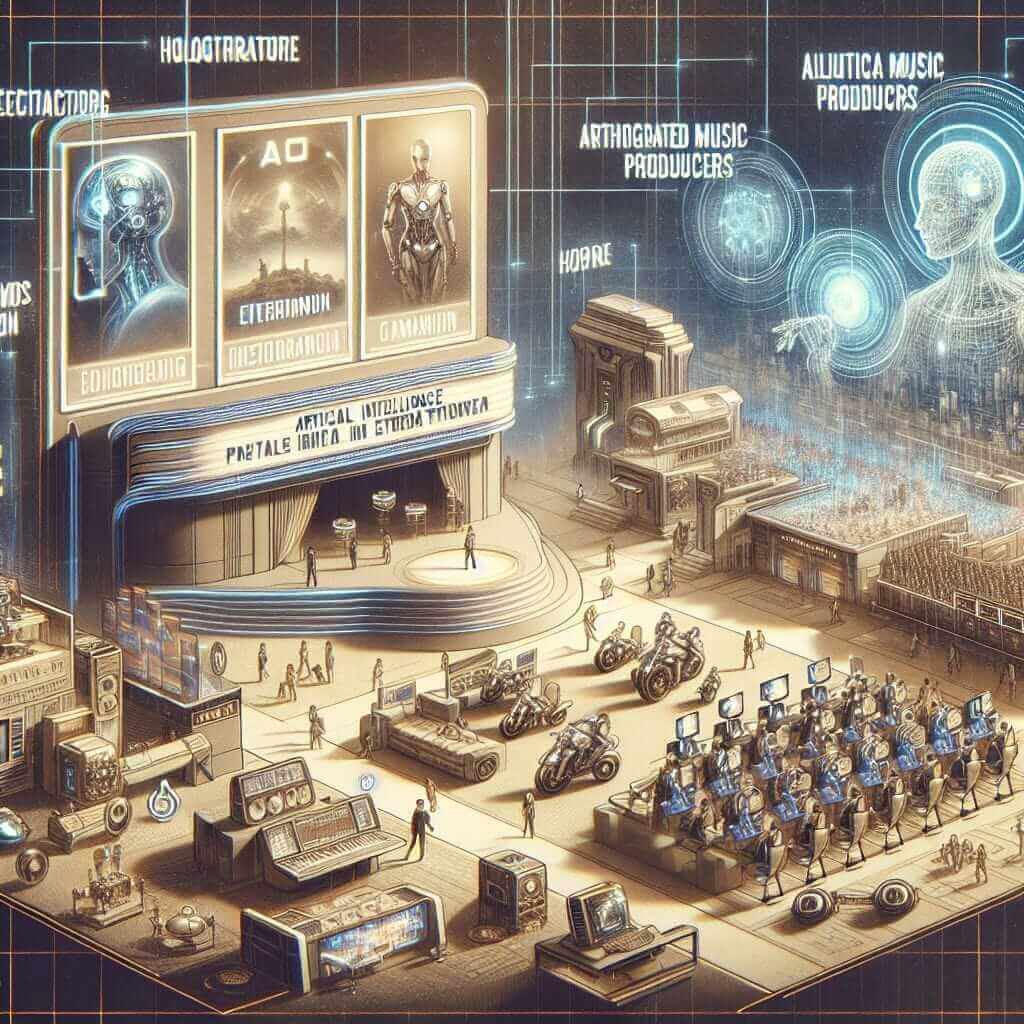The IELTS Reading test evaluates a candidate’s ability to read and understand different types of texts. Given the increasing relevance of artificial intelligence (AI) in society, topics related to AI, such as its implications in entertainment, are becoming more frequent in IELTS exams. Understanding these multifaceted implications helps test takers not only prepare for the exam but also gain insights into a crucial contemporary issue.
Reading Passage: The Social Implications of AI in Entertainment
Passage
Artificial Intelligence (AI) has increasingly become a significant part of the entertainment industry, transforming the way we create, distribute, and consume media. From sophisticated algorithm-driven content recommendations to AI-generated music and films, AI is reshaping the entertainment landscape in unprecedented ways.
One major social implication of AI in entertainment is the democratization of content creation. AI tools allow individuals and small creators to produce high-quality content that was once reserved for large studios with significant resources. This democratization has led to a diversification of voices and perspectives in the media, promoting inclusivity.

Moreover, AI’s role in personalizing content recommendations also raises questions about data privacy. Algorithms analyze vast amounts of user data to predict preferences, which often leads to concerns about how this data is collected, used, and potentially misused by companies.
AI-driven virtual reality (VR) and augmented reality (AR) experiences are another landmark in entertainment, offering immersive experiences that can transform social interactions and leisure activities. However, these advancements come with concerns about social isolation, as individuals may increasingly choose virtual interactions over real-life engagements.
Additionally, AI’s ability to create deepfake videos—a technology that superimposes a person’s likeness onto another’s body—is a potent tool for entertainment. While it holds great promise for creating revolutionary visual effects in films, it also poses ethical dilemmas regarding consent, authenticity, and potential misuse.
Another critical implication is job displacement in the entertainment sector. With AI automating numerous tasks in content production, traditional roles such as editors, sound engineers, and even actors might face redundancy. This shift calls for reshaping job training programs to equip the workforce with skills suited for an AI-driven world.
In conclusion, while AI offers transformative benefits to the entertainment industry, it also brings forth significant social implications. Addressing these issues requires a nuanced approach that considers both the potential benefits and the ethical, social, and economic challenges posed by this technology.
Questions
Multiple Choice
-
Which of the following is a positive social implication of AI in entertainment mentioned in the passage?
- A. Increased data privacy
- B. Job displacement
- C. Democratization of content creation
- D. Creation of deepfake videos
-
What concern is associated with AI-driven content recommendations?
- A. Limited content variety
- B. Data privacy
- C. Over-reliance on VR and AR
- D. High production costs
True/False/Not Given
- AI-generated content is exclusively created by large studios. (False)
- Deepfake technology is only used in a positive manner. (False)
- The passage mentions that AI can automate tasks in content production. (True)
Summary Completion
Complete the summary below.
AI is significantly transforming the entertainment industry. It has democratized content creation, allowing more __ (1) to produce high-quality media. However, the reliance on user data for content recommendations raises questions about __ (2). Moreover, AI’s role in VR and AR offers immersive experiences but may increase __ (3). Ethical issues also arise with deepfake technology, which can be used to create highly realistic videos. Finally, the automation of production tasks by AI leads to concerns about __ (4).
- (creators)
- (data privacy)
- (social isolation)
- (job displacement)
Answer Key
Multiple Choice
- C. Democratization of content creation
- B. Data privacy
True/False/Not Given
- False
- False
- True
Summary Completion
- creators
- data privacy
- social isolation
- job displacement
Common Mistakes
- Misunderstanding Key Points: Ensure you understand the main ideas of the passage rather than focusing on specific sentences.
- Ignoring Context: Read questions carefully and consider the context in which words and phrases are used.
- Rushing: Take your time to read both the passage and questions thoroughly.
Vocabulary
- Democratization /dɪmɒkrətaɪˈzeɪʃn/ (n): The action of making something accessible to everyone.
- Algorithm /ˈælgərɪðəm/ (n): A process or set of rules to be followed in problem-solving operations.
- Virtual Reality /ˈvɜːtʃuəl rɪˈæləti/ (n): A simulated experience that can be similar to or completely different from the real world.
Grammar Focus
- Relative Clauses: “AI tools allow individuals and small creators to produce high-quality content that was once reserved for large studios.”
- Passive Voice: “AI is reshaping the entertainment landscape in unprecedented ways.”
- Modal Verbs: “These advancements come with concerns about social isolation.”
Tips for a High Reading Score
- Practice Regularly: Incorporate a variety of Reading passages into your study routine.
- Understand Question Types: Be familiar with different types of questions and strategies to tackle them.
- Improve Vocabulary: Regularly learn and review new words and their usage.